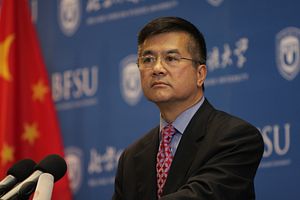U.S. Ambassador to China Gary Locke officially stepped down from his post and departed from Beijing last week. For some in China, the sentiment amounted to “good riddance.” It’s hardly been a smooth few years—under Locke’s tenure, the U.S. announced its “pivot to Asia” policy even while continuing its traditional practices of speaking out on human rights and selling arms to Taiwan. As is often the case, as ambassador Locke was sometimes held personally responsible for these decisions, even though he probably had very little (if any) say in determining U.S. policy towards China.
However, in addition to these general criticism, there has also been a disturbing amount of anti-Locke sentiment that focuses on his race. A now-infamous article published by China News Service called Locke a “banana man”—possessed of “yellow skin” but with a “white heart.” The article even denigrated Locke’s comment that he was leaving China for his children by saying that apparently Locke wants to make the next generation serve America—as though there is something evil about Locke passing his pro-American perspective on to his children. The article saw Locke’s race as part of Obama’s greater plot to undermine China by constantly criticizing China’s human rights record.
From an American perspective, it’s a given that the U.S. Ambassador to China will address human rights issues—it’s a high-profile part of U.S.-China relations, and the ambassador’s job is to convey the official U.S. position. However, Locke raising these issues was apparently problematic because of his race. The author of the China News Service piece (the name attached to the piece, Wang Ping, is assumed to be a pseudonym) seems to feel that Locke is both abnormal and dangerous: Locke is abnormal because he is ethnically Chinese but his loyalties lie with America, and he’s dangerous because somehow his race makes his speeches and actions more persuasive to other Chinese.
In a ChinaFile conversation on the China News Service article, Kaiser Kuo commented that the term “banana man” implied “that Locke is a ‘race traitor’ who lacks the political loyalty to the Chinese nation that his blood should somehow confer.” In other words, Locke’s position as U.S. Ambassador were more objectionable because some in China assumed he would maintain ultimate loyalty to the home of his ancestors.
As ridiculous as this assumption sounds to Americans, the China News Service article was far from alone in believing that Locke, as a Chinese-American, ought to be more sympathetic to China. When Locke was first nominated for the post, an article in the Global Times mused that “with the knowledge of Chinese traditions and methods in dealing with problems, [Locke] can recognize subtle cultural cues and have a better understanding of the operation of Chinese policies.” The same article warned that “a Chinese-American ambassador will not necessarily be friendly to China,” but seemed to believe that any ‘unfriendliness’ from Locke would ultimately stem from changing tides in Washington, not from Locke’s own personal opinions.
Similarly, just before Locke arrived in Beijing to take up his post, the Guangming Daily published an article warning Chinese to be wary of the “American ‘new colonialism’” brought by Locke. This article, like the China News Service piece, suggested that Locke’s race was part of a dastardly plot. Locke’s “Chinese identity enables him to attract the eyes of the world’s Chinese people and to gather public opinion, and can enable him to engender affinity among China’s common people,” the article said. “But who knows? [Perhaps] this completely reveals America’s base intention to instigate political turmoil in China by sending a Chinese to control the Chinese.”
These attacks were not just limited to Chinese media outlets. An article in the Los Angeles Times noted that even before Locke was confirmed as ambassador, some Chinese netizens were already calling him a “traitor.” And if such attacks were not uncommon before Locke even took up his post, it’s not hard to see why China News Service would attack Locke even more vehemently after he oversaw the Chen Guangcheng affair and orchestrated the public posting of data on Chinese pollution levels.
Strangely, these attacks mesh with one that has been whispered in the U.S.—that Locke only received the ambassadorship because of his race. The Chinese articles suggest that Locke’s race was an instrumental part of Obama’s plan. This argument means that Locke’s most important attribute was his Chinese heritage, an assumption that instantly devalues Locke’s qualifications as former governor of Washington state and former Commerce Secretary.
It used to be a tradition in U.S. foreign policy not to send ambassadors to a country that connects to their ethnic background. That way, the thinking went, the host country would never be tempted to consider the U.S. ambassador “their guy” and not Washington’s. This policy could obviously result in well-qualified candidates not getting the post. Locke represented a welcome departure from this common wisdom, but as a result he suffered ethnic slurs and taunting on top of the traditional criticisms of U.S. ambassadors to China. Being the representative of Washington, DC in Beijing is no easy task no matter one’s race. But in some quarters, Locke’s ethnicity provoked particularly virulent responses precisely because, as a Chinese, people assumed he would be different.
Locke himself attempted to nip this issue in the bud in his first speech upon being nominated as ambassador. “I’m going back to the birthplace of my grandfather, my father, my mom and her side of the family, and I’ll be doing so as a devoted and passionate advocate for America, the country where I was born and raised,” Locke said. For some in China, this message never sank in.
Fortunately for new ambassador Max Baucus, his race won’t be a problem. As the U.S. ambassador to China, he’ll face his share of criticisms and barbs from the Chinese press, but none of them will attack him for being white.

































